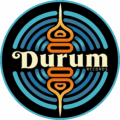At Durum Records, we’re drawn to artists who dig deep into their roots while reaching far into the unknown. Naxatras is one of those bands. What started as a heavy, psychedelic journey has evolved into a full-blown mythological universe blending progressive rock, cosmic storytelling, and, more recently with the release of their new album ‘V’, echoes of traditional Greek music. We spoke with Giannis Vagenas about the band’s name, their evolving sound, and the ancestral energy flowing through their latest album.
⸻
Introduction
What does ‘Naxatras’ mean in Greek?
“Naxatras” isn’t a Greek word, it actually comes from Sanskrit and refers to the lunar mansions in Hindu astrology. The original spelling uses “ksh,” but we chose to replace that with an “x”. First we were named Dust and later Temple, but we wanted something more unique and memorable. Then I came across ‘Naxatras’ and the sound of that word felt mystical, and it stuck with us. It fits the atmosphere of our music. And even though we’re not deeply rooted in Hindu philosophy, the concept resonates with our artistic direction.
How would you describe your music to someone who’s never heard you before?
We’ve been using this line since our debut, and it still fits: “Trippy, groovy, heavy stuff straight from the heart of the universe.” Our sound is psychedelic, riff-heavy, and emotionally driven. Always played from the heart.
What kind of stories do you tell with your songs?
In the beginning not that much. Our first albums were more abstract and freeform. But starting from our third record, we began building a universe through the music, visuals, album art, and merch. Our fourth album became a full concept album, and our fifth and most recent one is a prequel to that tale. It follows a being called the Spacekeeper, who is a powerful entity like a guardian. He is sent on a quest by the moon goddess Numenia to protect the land of Narahmon from the invading Void.
And those stories, do they come from your Greek heritage or somewhere else?
It’s a multi-cultural thing. Numenia means new moon in Greece and I was fascinated by that word. It’s the three-faced goddess, a common archetype. And most of our songs come from universal mythological archetypes: Greek, Egyptian, Mesopotamian, creating something familiar yet fantastical.
⸻
Roots
Are your roots part of your music?
Absolutely. Our keyboard player, who also plays guitar, is deeply involved in the Greek music scene as a session musician and brings a strong understanding of traditional Greek and Turkish elements. You can especially hear those influences on our latest album. It was a conscious decision to bring in more of that heritage . We first wondered if it might be too different, but the response was overwhelmingly positive. You see a lot of bands lately that add traditional influences to their sound, people really connect to the authenticity it adds.
What are some of the musical influences that shaped your sound?
We all grew up listening to the classics: Pink Floyd, The Doors, Jimi Hendrix, The Beatles, Black Sabbath. Then we moved into heavier 90s stuff like Kyuss and Monster Magnet. Eventually, we explored 70s prog rock – Camel, Gong, Eloy and Hawkwind – and more recently, we’ve been inspired by way more diverse modern bands like King Gizzard & the Lizard Wizard, Altin Gün and Glass Beams. There’s also some electronic influence from acts like Ozric Tentacles. Each band member brings their own musical world into the mix.
What does fusion mean to you?
For us, fusion is natural – something that happens unconsciously. We write music democratically, so every member brings in their own style and background. It’s like the merging of the stars, we are different people and we like different stuff: One leans more electronic, another more eastern or progressive. There’s no strategy, it’s just who we are. The result is a genuine mix of styles that reflects our shared creativity.
Do you see yourselves as building cultural bridges through music?
Definitely, I think that’s one of the most important things now. It’s also in the concept of the album. A lot of fucked up stuff is happening in the world today. The common ground between these things, is that’s it’s never the people. It’s politics and technology that drives us apart. Music is a way to resist that, to highlight what we share across cultures. Through storytelling, visuals, and sound, we try to connect ancient archetypes and collective memory with a modern voice.
⸻
Live
How do you bring that to life on stage?
We don’t talk much on stage, we just play and let the music do the work. But we often incorporate visuals and performances. At our 10-year anniversary show in Athens, we had the dancers from the Numenia video live on stage, and they’ll return for our upcoming album launch show. That mythological, ritual energy is part of the live experience.
⸻
Inspires
What’s next for Naxatras?
We’re heading into a summer of shows, some in Greece, others across Eastern Europe and the Balkans. In September, we’ll do a special live presentation of the new album in Athens. And next year, we’ll tour more extensively through Europe, including the Netherlands. We haven’t started writing new songs yet… but it’s been almost a year and it’starting to bubble up again.

